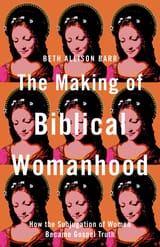Search Results
7/11/2025, 1:52:24 AM
>Biblical womanhood--the belief that God designed women to be submissive wives, virtuous mothers, and joyful homemakers--pervades North American Christianity. From choices about careers to roles in local churches to relationship dynamics, this belief shapes the everyday lives of evangelical women. Yet biblical womanhood isn't biblical, says Baylor University historian Beth Allison Barr. It arose from a series of clearly definable historical moments.
>The most prominent example of this contextual reading of Paul comes in the classic “women are to be silent” passage. Barr writes how her church resisted her as a last-minute youth Sunday School substitute. Not because she was unqualified—she was a university professor who taught high school through graduate students—but because she was a woman. Women don’t teach men, even if those “men” are aged thirteen. After discussion, Barr is allowed to act as a “facilitator”—she can go through the sermon questions from the week before—but isn’t allowed to teach. Why not? 1 Cor. 14:33-36.
>After telling her personal experience, Barr attacks that interpretation with fervor. She dives into the history of Rome to give historical context. She then suggests that Paul isn’t admonishing the believers to adhere to this practice, but is stating what the common practice is before refuting it. Paul does this elsewhere in 1 Corinthians, perhaps taking from Jesus who employed the technique in his Sermon on the Mount. Her conclusion: Far from saying that women should be silent, Paul is telling men that, in the world of Jesus, women are allowed to speak: “‘It is shameful for a woman to speak in church.’ [Paul quotes] What! Did the word of God originate with you, or are you the only ones it has reached?” – 1 Cor 14:35-36, RSV
Thoughts on this? Has the Bible actually always permitted women to be formal leaders within church?
>The most prominent example of this contextual reading of Paul comes in the classic “women are to be silent” passage. Barr writes how her church resisted her as a last-minute youth Sunday School substitute. Not because she was unqualified—she was a university professor who taught high school through graduate students—but because she was a woman. Women don’t teach men, even if those “men” are aged thirteen. After discussion, Barr is allowed to act as a “facilitator”—she can go through the sermon questions from the week before—but isn’t allowed to teach. Why not? 1 Cor. 14:33-36.
>After telling her personal experience, Barr attacks that interpretation with fervor. She dives into the history of Rome to give historical context. She then suggests that Paul isn’t admonishing the believers to adhere to this practice, but is stating what the common practice is before refuting it. Paul does this elsewhere in 1 Corinthians, perhaps taking from Jesus who employed the technique in his Sermon on the Mount. Her conclusion: Far from saying that women should be silent, Paul is telling men that, in the world of Jesus, women are allowed to speak: “‘It is shameful for a woman to speak in church.’ [Paul quotes] What! Did the word of God originate with you, or are you the only ones it has reached?” – 1 Cor 14:35-36, RSV
Thoughts on this? Has the Bible actually always permitted women to be formal leaders within church?
Page 1
